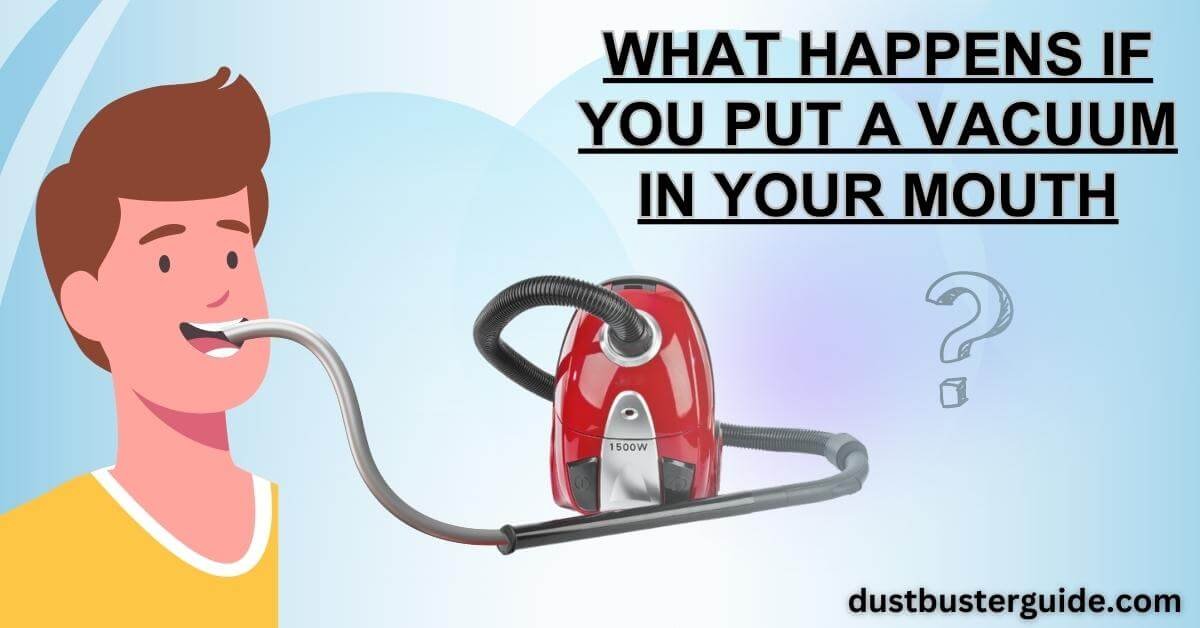Curiosity leads us to strange questions, and today we’re tackling one: what happens if you put a vacuum in your mouth? Picture this: a vacuum, typically a household hero, taking an unexpected detour. But before you embark on a whimsical experiment, here’s the straight scoop – putting a vacuum in your mouth is not a recommended endeavor.
Attempting this could lead to various risks, including injury to your mouth, throat, or even lungs due to the strong suction power. Join us on this journey of common sense and safety, as we advise against turning your vacuum into an unconventional taste tester.
Get ready to satisfy your curiosity through safer channels, ensuring that your cleaning companion remains just that – a tool for tidying up, not for culinary exploration!
What Is Meant By The Improper Usage Of Vacuum Cleaner
Before we find out what happens if you put a vacuum in your mouth, let us clarify what we mean by “improper usage” when we say that improper vacuum cleaner usage can cause serious health problems:
- Using a vacuum cleaner to rescue someone who is choking.
- Using a vacuum cleaner to relieve constipation.
- People occasionally put their mouths in the vacuum cleaner unconsciously or carelessly.
- Children occasionally play with the vacuum cleaner’s hose and stick their mouths in the vacuum.
- People sometimes use a vacuum cleaner to clean their stuffy noses.
- Some people use a vacuum to remove ear wax.
- People have also attempted to use vacuum cleaners as fire extinguishers.
All these points we have mentioned above count as the improper usage of vacuum cleaners that can cause serious health issues.
Detailed Discussion On What Happens If You Put A Vacuum In Your Mouth
So, now that you’re aware of the improper usage of vacuum cleaners, let’s get to the bottom of our most pressing question: what happens if you put a vacuum in your mouth.
Is it a good idea to use a vacuum cleaner to help someone who is choking? After all, a vacuum cleaner sucks dirt and debris, so you’d imagine it might also suck food lodged in someone’s throat. That is not correct. It can cause serious lung injuries and destroy your alveoli, the delicate, spongy tissue in the lungs that is essential for blood gas exchange. So we don’t recommend using a vacuum to pull that trapped food out of your throat. Please do not attempt this. Instead, you can attempt alternative safe hacks such as drinking a can of Coke or another carbonated beverage that may assist in releasing food lodged in the esophagus, according to research.
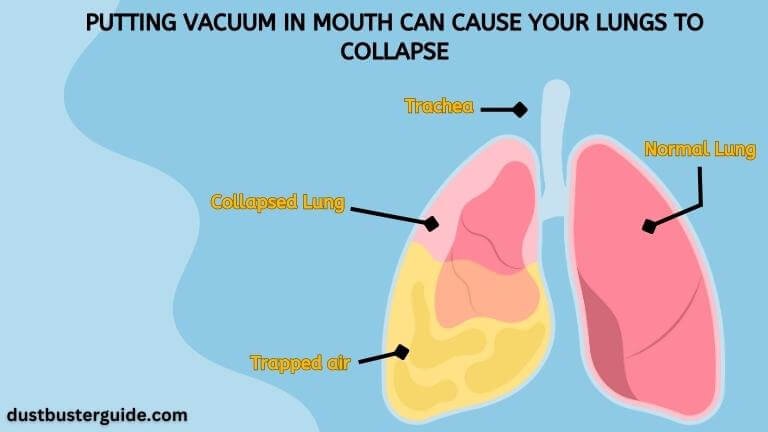
We have observed people utilizing shop vacuums to ease constipation (apparently, and we are not kidding). It will only result in serious rectal prolapse, effectively turning your lower intestine inside out. It stops you from breathing in and even from breathing through your nose. Putting a vacuum in your mouth has the potential to collapse your lungs. It sucks up all the air from the lungs and puts undue strain on them. The extent of harm here is determined by the vacuum cleaner’s total strength and how well it is sealed with your mouth and nose. If the damage is severe, you may need to take some time off, get plenty of rest, and get enough oxygen.
How Lung Hemorrhage Can Be Caused By Putting A Vacuum In Your Mouth
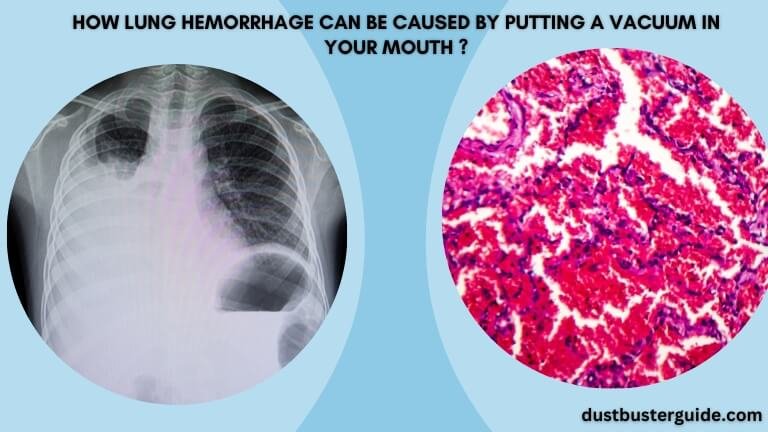
While a vacuum cleaner may be able to dislodge a delightful rice treat, it also poses the risk of lung bleeding. In layman’s words, it damages a big blood vessel or the brachial artery.
Suppose suction is maintained with a partially clogged airway. In that case, it will disrupt blood-gas exchange and either asphyxiate or lead to CO2 intoxication, both of which are lethal, especially when all the ‘possible’ damage to the vascular and lymphatic vessels in the lungs is considered.
A vacuum formed inside your body: between the lungs and the chest cavity keeps your lungs inflated (pleural space). It is feasible to produce a vacuum stronger than the vacuum currently within your body by placing a vacuum cleaner hose in your mouth and turning it on. It can cause your lungs to collapse. Your body will try to equalize the pressure by slightly opening your epiglottis and sucking air back into the lungs to protect itself. It will be hard to breathe if both lungs collapse.
What Happens If You Put A Vacuum To Your Ear
As we previously mentioned, many people are concerned about the significant health consequences of improper vacuum cleaner usage. After what happens if we put a vacuum in your mouth, the second most asked question is, what happens if you put a vacuum in your ear. Now that we’ve answered your first question let’s get to the bottom of our second.
Aren’t we all aware that not everything we see on the internet is true? Though social media has made life easier for all of us, some of its content can be misleading in some respects, such as trying various nonsensical tricks. According to our research, people attempted to vacuum inside their ears only to clean the wax and they also misled other people to do the same if they wished to get their ear wax out. It is not a good idea, we assure you.
Vacuuming the ears will rip your tissue to a certain extent. Tissue ripping may occur in the canal or the eardrums themselves. It can result in temporary to permanent hearing loss. And in no case do we want it. Right? However, a method for removing extra ear wax involves ear vacuuming. However, you may end up doing more harm than good without professional assistance. People in today’s modern period want expert help to clean off all the ear wax, which involves cleaning with micro-suction technology.
Thinking Of Putting The Vacuum Clever In Your Eyes? Bad Idea
Thinking of putting the vacuum cleaner in your eyes is unquestionably a bad idea. The suction force of a vacuum cleaner is powerful and can cause severe harm to delicate eye tissues. The eyes are sensitive organs, and any attempt to bring a vacuum cleaner close to them poses a significant risk of injury.
Such actions can result in damage to the cornea, conjunctiva, or other eye structures, leading to pain, vision impairment, or even permanent harm. It’s imperative to prioritize safety, avoiding any behavior that may jeopardize eye health. If accidental eye exposure to a vacuum occurs, seek immediate medical attention to address any potential injuries and ensure proper care.
Can A Vacuum Cleaner Kill You (Here’s The Truth)
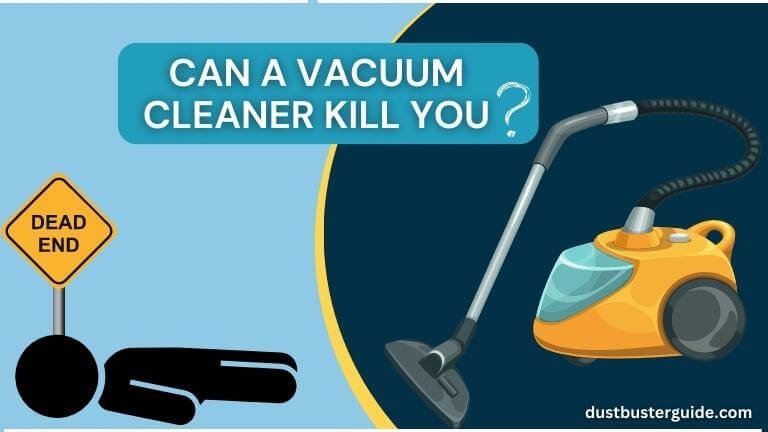
When it comes to the major adverse effect that vacuum cleaners may have on your health, while there are people who looked for what happens if you put a vacuum in your mouth or ear, there are also other scared individuals who directly searched can a vacuum cleaner kill you? So here’s the truth we have for you.
We received very few reports of people dying from a vacuum cleaner in our poll. However, your carelessness might result in major injuries and fire events, which can lead to death in severe circumstances.
While surfing the internet, we discovered that in 2012, a fire broke out in a U.S. nuclear submarine. They said that the vacuum cleaner caused the fire, as continuous usage caused the motor to heat up and cause it to catch fire. You must be prepared ahead of time in any emergency event, such as a fire. However, the situation could occur unexpectedly. And prompt action will be required. You may have to use whatever you find with your own eyes to get you out of danger.
Sometimes because of static charge buildup from low humidity situations, your vacuum gives you electric shocks. As you operate your vacuum, it will collect static from the carpet and the air, which may cause it to shock you when touched. In severe situations, these electric shocks can cause death by paralyzing the brain’s respiratory center or the heart.
As we all know, dust is a significant asthma trigger. So, if you have elderly individuals in your home who have asthma, cleaning frequently can have a deadly health effect on them as they can die from suffocation, which is why you must take the correct steps immediately.
However, whether or not a vacuum cleaner can kill you is entirely dependent on your personal health status, as well as the severity and method of vacuum usage.
Can You Breathe Inside A Vacuum Cleaner
Now that you’re aware of the serious health risks associated with improper vacuum usage, you’re probably wondering if there’s any way you can breathe inside a vacuum cleaner, which is similar to whether you can put a vacuum on your nose. Well? Again, we do not recommend it.
We do not encourage using a vacuum on your nose, just as we do not recommend using one in your mouth or ears. As you may know, the vacuum cleaner is used to clean dry dust, and it is also used to keep dry trash inside the vacuum bag. So it accumulates dust, debris, and germs such as bacteria. So, if you or your child, by any chance, attempt to breathe inside the vacuum cleaner, you should be aware of the implications. When you breathe inside the vacuum cleaner, you will notice that all dirty air has made its way into your respiratory system. And you know how hazardous and unhealthy it may be for little children.
Many researchers suggest that when a person breathes inside a vacuum cleaner, the person becomes more susceptible to illnesses and allergies. Furthermore, they cause a slew of respiratory issues.
Can You Vacuum Someone To Save Them From Choking
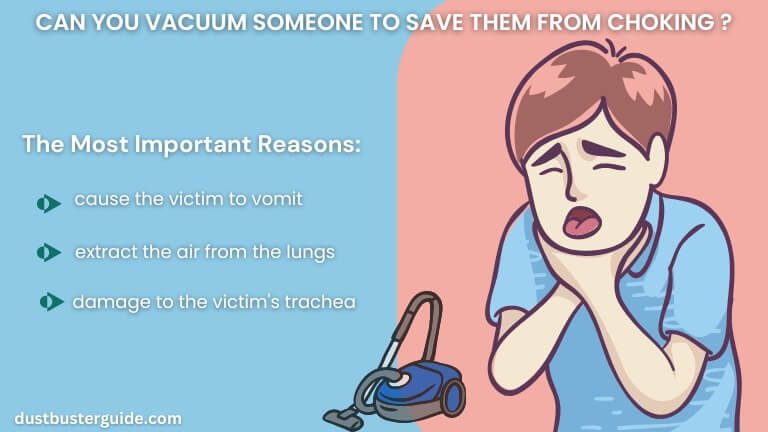
Do you remember when we talked about what happens if you put a vacuum in your mouth? We warned you not to use a vacuum cleaner to try to save someone who is choking
So, let us explore why not to do so. The following are some of the most important reasons:
- A vacuum cleaner will extract the last bit of air from their lungs, and a choking sufferer is already depleted of oxygen.
- Putting something in their mouth will cause the victim to vomit, making matters worse.
- The vacuum could cause damage to the victim’s trachea, exacerbating the situation.
What Can You Do Instead Of Using A Vacuum Cleaner – Heimlich maneuver – CPR
So now you know you can’t use a vacuum cleaner to save a person from choking, so what else can you do to help them? We have discussed it here. CPR or the Heimlich maneuver are the two options.
While the person is conscious and erect, you perform the Heimlich maneuver. When the choking person collapses and is unconscious, use CPR compressions to dislodge the object. Then tilt the person on their left side to allow gravity to take its course.
The Heimlich Maneuver (or CPR if necessary) is easy and requires only a pair of hands. It is far safer than fleeing to obtain a dangerous machine, such as a vacuum cleaner, that you have no experience misusing as a medical device to save someone’s life.
Protective Measures
Now that you know the potential health consequences of inappropriate vacuum use, you should be afraid to use a vacuum cleaner. That is not the case because we are here to make your life easier. We have included warnings and precautionary steps that you should be aware of so that you do not wind up in troubled water. So, let us have a look:
- Always use a hose end protector and a hose end with a handle to keep the hose operator’s arms a short distance from the end of the hose.
- Always utilize an inline vacuum relief valve when working near the end of a hose or pipe.
| Method/Action | Purpose | Description |
|---|---|---|
| Vacuum Cleaner | Cleaning | Removes debris with suction from floors and carpets. |
| Heimlich Maneuver | Choking Rescue | Clears blocked airway by delivering abdominal thrusts. |
| CPR | Life-saving | Maintains circulation and oxygenation during cardiac arrest. |
| Broom and Dustpan | Cleaning | Sweeps and collects dry messes for disposal. |
| Plunger | Blockage Removal | Creates suction to unclog drains and toilets. |
| Mop and Bucket | Cleaning | Uses water and solution for cleaning floors. |
| Gravity | Choking Rescue | Encourages coughing or leaning to aid choking victim. |
| Back Blows/Chest Thrusts | Choking Rescue | Clears infant airway by applying back blows and chest thrusts. |
| Rescue Breaths | CPR | Provides oxygen to victim when chest compressions aren’t possible. |
Conclusion
We believe you must have found every possible answer to your what happens if you put a vacuum in your mouth? question in this article. Though vacuum cleaners make our lives easier, your simple oversight can convert this cleaning appliance into an evil machine. People sometimes occasionally try to get creative with the vacuum cleaner and place it in various parts of the body, causing injury to the body part.
However, you should not be concerned about vacuum cleaner accidents. All you have to do is be cautious when using the vacuum cleaner.
FAQs
Can a vacuum hurt you?
The suction will inflict severe injury or death if you contact it. A vacuum-related injury can be severe, so you must stop the vacuum action as soon as feasible.
What if you put a vacuum cleaner in your mouth?
You risk severely injuring your lungs and tearing your alveoli, the delicate, spongy tissue in the lungs that regulates blood gas exchange.
Can a vacuum cleaner electrocute you?
If you clean your home regularly and use your vacuum cleaner correctly, there is very little chance it may electrocute you. If you use your vacuum cleaner incorrectly, you can be electrocuted because the vacuum contains electrical currents.
Can you use a vacuum to help someone who is choking?
It is not at all a good idea. A vacuum cleaner will extract the last bit of air from the sufferer’s lungs, and a choking sufferer is already deprived of air. Putting something in their mouth will cause the person to vomit, making matters worse. The vacuum could cause damage to the victim’s trachea, exacerbating the situation.
How would I remind my 8-year old not to put the shop-vac hose in their mouth?
Politely explain to your 8-year-old that putting the shop-vac hose in their mouth is unsafe and can be harmful. Emphasize the importance of using the vacuum for its intended purpose and encourage them to ask questions about safety.
What happens if you suck up fire with a vacuum cleaner?
Attempting to suck up fire with a vacuum cleaner is extremely dangerous and should never be done. The vacuum can ignite flammable materials, leading to a fire hazard, damaging the vacuum, and posing a serious risk to safety.

